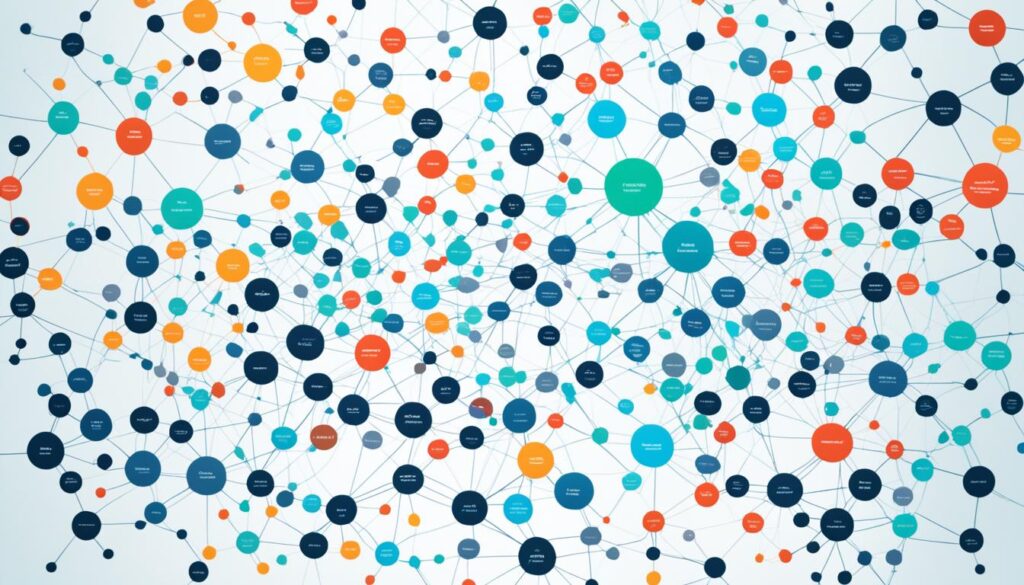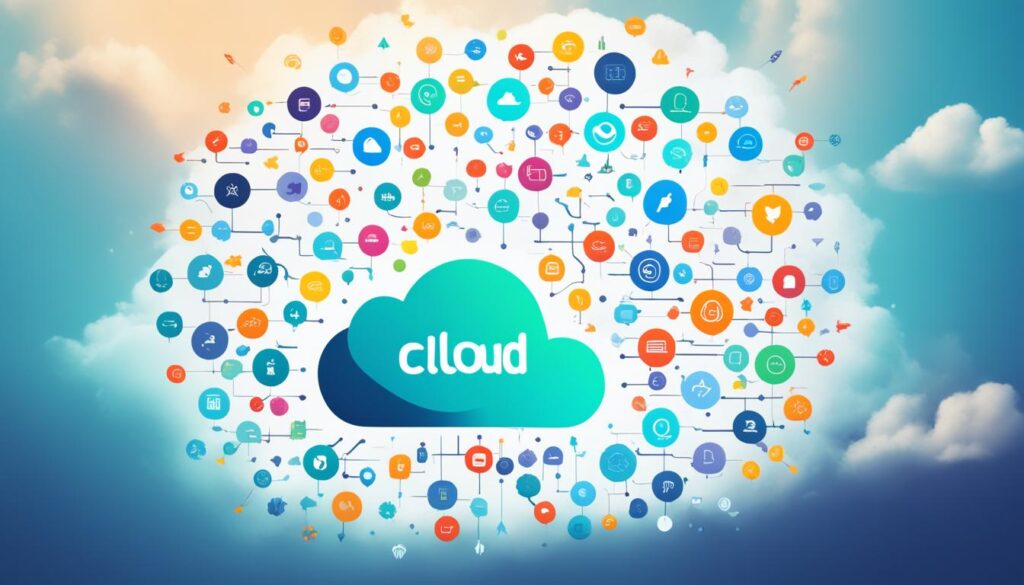The reseller channel sales market is set to hit $1.7 trillion by 2024. This makes it a key part of the B2B SaaS world. SaaS companies now see the channel as vital for their marketing plans.
By working with partners, SaaS providers can reach more people and grow their revenue. This shift has made the channel a key player in the industry.
Key Takeaways
- The reseller channel sales market is estimated to reach $1.7 trillion by 2024, underscoring its importance in the B2B SaaS industry.
- SaaS companies are redefining the value of partnering, viewing the channel as an ecosystem of technology partners with APIs.
- The channel enables SaaS companies to tap into the expertise and networks of their partners, allowing them to reach a wider audience and drive revenue growth.
- AI and advanced analytics are emerging technologies transforming reseller programs, improving sales performance and customer experience.
- Continuous partner enablement and personalized experiences are crucial for navigating the evolving reseller sales landscape and boosting sales.
The Role of the Channel in SaaS

The role of the channel in the Software as a Service (SaaS) industry has changed a lot lately. Now, channel partners are more than just resellers or referral agents. They are a key part of the channel partner ecosystem that helps SaaS companies succeed. By working with this ecosystem, SaaS providers gain from the partners’ knowledge, customer connections, and setup skills.
Benefits of the Channel in SaaS
Using APIs is a big plus for the channel in SaaS. These APIs let partners create solutions that meet their customers’ specific needs. This partner relationship management helps SaaS companies reach more people through the partner programs their partners offer.
The indirect sales model used by channel partners can really help SaaS companies grow. In fact, studies show that SaaS companies with strong channels grow their revenue faster. This is because channel partners can offer software licensing and channel marketing strategies that appeal to their customers.
Challenges of the Channel in SaaS
Even with its benefits, the channel brings challenges for SaaS providers. One big challenge is losing control over sales. When working with channel partners, SaaS companies need to balance giving partners freedom and keeping an eye on the customer experience.
Another challenge is making sure partners are aligned and ready to sell and support the solutions. SaaS companies must put a lot of effort into partner enablement programs. This means investing time and resources, but it can lead to more sales and happier customers.
Types of Partners in the SaaS Channel

In the world of SaaS, strong partnerships are crucial for growth and success. As a SaaS company, we need to build strong bonds with various channel partners. Each partner brings special skills and abilities to the table.
Value-added resellers (VARs) are key partners. They can customize and integrate our SaaS to fit their clients’ needs. With their deep knowledge and close customer ties, VARs boost product use and improve the customer experience.
System integrators (SIs) are also vital. They make sure our SaaS fits well with the client’s current tech setup. Their skills in making workflows better and increasing efficiency are a big help to our customers.
Managed service providers (MSPs) are crucial too. They handle the day-to-day management and support of our SaaS. This lets our customers focus on their main business, knowing their SaaS is well taken care of.
VARs, SIs, and MSPs are the core of the SaaS channel. Working closely with them helps us reach more customers, increase product use, and give better customer experiences. This leads to sustainable growth for our SaaS business.
“Approximately 90% of IT sales are partner-assisted, indicating the significance of marketplaces in channel sales.”
The SaaS world is always changing. We must stay flexible and look for new partnership opportunities that fit our goals. By using the skills of VARs, SIs, and MSPs, we can fully tap into the SaaS channel. This helps us grow our business for the long run.
Leveraging App Stores and Marketplaces

The B2B SaaS world is changing fast. Now, cloud software distribution is changing how value-added resellers and partners work with customers. SaaS companies use app stores and marketplaces to offer software that meets specific customer needs in one place.
Benefits of Leveraging App Stores and Marketplaces
Being part of these programs and marketplaces helps SaaS companies reach more people. They can find a focused customer group and make buying software easier for customers and value-added resellers. The main advantages are:
- Increased Reach: App stores and partner marketplaces give SaaS companies a chance to meet more potential customers, growing their market.
- Targeted Customer Base: These platforms help SaaS companies find customers who need their solutions.
- Streamlined Customer Experience: App stores and marketplaces make buying software licensing easy for customers, offering a smooth buying process.
- Exposure to a Larger Partner Audience: Joining partner programs lets SaaS companies work with more value-added resellers and developers. This can make the core SaaS product better.
A recent report by Tackle.io shows the cloud software distribution market is growing fast. Over 50% of companies are selling business apps or data products through these channels. The growth of B2B tech and SaaS app stores is a big trend, showing how important it is to build strong ecosystems.
“Hyperscaler marketplaces offer a unique opportunity for ISVs and could yield up to $2B in transaction fees by the end of 2025.”
As more companies use partner marketplaces, SaaS companies that use these platforms well can do well over time. They can connect with a wide network of value-added resellers and find new ways to grow and get more customers.
Transforming Channel Management
In the fast-changing B2B SaaS world, smart companies are updating their channel management plans for better success. They use new tools like Crossbeam to solve the Partner Prisoner’s Dilemma. This helps create a stronger partnership with their channel partners.
Crossbeam is a leading software that lets SaaS companies share data safely with their partners. This opens up new chances for working together without sharing sensitive info. It helps break down data barriers and improve communication, making the channel ecosystem work better.
Also, PRM (Partner Relationship Management) platforms are changing how SaaS companies handle their partner programs. These advanced tools make managing partners easier. They give partners the tools, training, and support they need to succeed in the competitive B2B SaaS market.
“Channel sales leaders need years of experience in indirect selling and a strong grasp of the business. Channel sales managers monitor metrics to optimize sales programs.” – Industry Expert
As partner relationship management, partner programs, and channel marketing strategies grow, SaaS companies can handle the complex indirect sales and software licensing better. By using these new technologies and strategies, they make a better experience for their channel partners. This leads to lasting growth and success.
The future of channel management in B2B SaaS looks bright, with companies exploring new ways to collaborate, share data, and support their partners. By adopting these new solutions, SaaS companies can fully unlock their channel ecosystems’ potential. This will help them lead in their industries.
Future of Channel Resellers in B2B SaaS
The future looks bright for channel sales in B2B SaaS. Companies with a channel partner network see faster revenue growth. As the SaaS industry changes, it’s key for companies to keep up with new trends and tech. The channel’s role is changing, and SaaS start-ups see it as a tech partner ecosystem with APIs.
This new view has changed the channel, making it key for many companies’ marketing plans. By 2024, companies are increasingly favoring channel sales as a preferred way to sell B2B SaaS products. This method is cheaper and lets companies grow faster and reach more customers.
The future of channel resellers in B2B SaaS is shaped by cloud software distribution, value-added resellers, and partner relationship management. SaaS companies see the need for partner programs and the indirect sales model to grow and enter new markets.
As software licensing changes, channel marketing strategies become more important for SaaS businesses. Companies must pick, train, and empower vendors. They need a clear channel sales strategy that fits their business goals.
“The shift in perspective has led to the evolution of the channel, making it an integral part of the go-to-market strategy for many companies.”
In the future, channel resellers’ success in B2B SaaS will depend on adapting to new markets, using new tech, and adding great value to partners and customers. By embracing the future of channel resellers in B2B SaaS, companies can grow and stay ahead in the fast-changing SaaS world.
Emergence of AI in Optimizing Reseller Channel Programs
Artificial intelligence (AI) is changing how businesses work with their reseller channel programs. It makes the partner experience better, offers more customization, and helps with data analysis and marketing automation. By using this new tech, companies can build stronger relationships with their channel partners.
Impact of AI on Partner Experience and Customization
AI helps match partners better, making the joining process smoother. It also personalizes training and support for each partner. Plus, AI helps partners make their co-branding campaigns more effective, giving customers a better brand experience.
Incorporating AI for Enhanced Data Analysis and Marketing
AI makes managing channels more efficient, cutting down on mistakes and improving accuracy. It also predicts market trends and helps with demand forecasting. By learning from data, AI helps create better partner profiles, leading to smarter business decisions.
AI is bringing big changes to marketing and sales, with a potential $3.3 trillion in global productivity gains. Already, AI is being used for tasks like A/B testing and ad optimization. As AI gets better, we’ll see more personalized marketing and teams run by AI.
More SaaS businesses are using AI, with 35% already using it and 42% planning to soon. Gartner predicts a 34% growth in AI use in SaaS, with the market reaching $27 billion by 2025.
“Artificial intelligence is the future, not the past.” – Tony Robbins
Using AI, companies can improve their reseller channel programs, strengthen partner relationships, and make marketing more effective. As AI keeps getting better, businesses will find more ways to stay ahead through AI-enabled channel programs.
Behavior-Based Incentives: A Shift in Reseller Motivation
The way we motivate resellers is changing, with a big move towards behavior-based incentives. This change means focusing more on what resellers do, not just how many sales they make. Companies now want to match reseller actions with what the market needs.
These incentives reward actions that help in reseller motivation, partner programs, and channel sales. They don’t just look at sales numbers. Instead, they aim to motivate resellers by rewarding actions that help the business grow over time.
Some key behaviors these incentives focus on include:
- Achieving sales goals
- Actively participating in training and enablement programs
- Improving customer satisfaction and retention
- Promoting and selling new product offerings
By focusing on these actions, companies can build a culture of ongoing improvement among their resellers. Behavior-based incentives make sure resellers meet the market’s changing needs. This keeps them flexible and ready to adapt.
Money rewards are still important, but these programs also use non-cash incentives. Things like recognition, special access to tools, and personalized experiences are boosting reseller motivation in new ways.
As partner programs and channel sales change, behavior-based incentives will keep being key to getting resellers involved and growing. These incentives make sure resellers work towards business goals. This benefits both the company and its channel partners.
“Behavior-based incentives help create a win-win scenario for both the company and its valued channel partners.”
Elevating Partner Enablement as a Strategic Imperative
In today’s competitive reseller channel, partner enablement is key for B2B SaaS companies. They need to give their partners the right tools and knowledge to sell well. It’s important to train partners in areas like product knowledge, sales, and customer service.
Getting feedback from partners is vital. It helps companies see what’s working and what’s not in their enablement efforts. By focusing on partner enablement and listening to their feedback, companies can make their partners stronger. This leads to better sales, a strong brand, and success.
Role-Specific Training for Channel Partners
Good partner enablement starts with training that meets each partner’s needs. This includes:
- Comprehensive product training to make sure partners know the features, benefits, and how to use them
- Sales and marketing skills to help partners sell the company’s products well
- Customer service tips to give partners the skills for great support and a better customer experience
By focusing on specific training, companies can build a network of skilled and confident partners. These partners can represent the brand well and drive sales.
Assessing Enablement through Partner Feedback
Getting feedback from partners is key to checking how well enablement is working. This can be done through:
- Regular surveys to see what partners think and find areas to improve
- Talking one-on-one with partners to understand their challenges and needs
- Looking at important metrics like partner satisfaction, engagement, and revenue
Using partner feedback helps companies make sure their programs stay relevant and valuable. They can meet the changing needs of their partners.
“Almost 60% of respondents in the ‘2023 Channel Partner Marketing Benchmark Survey’ expect partner-generated revenue to go up by more than 10% this year. About a quarter think it will increase by over 20%.”
By focusing on partner enablement and listening to partner feedback, companies can make their channel partners stronger. This leads to more sales, a strong brand, and success in their partner programs.
Personalization: Crafting a Tailored Partner Experience
In today’s fast-changing B2B SaaS world, partner personalization is key for partner loyalty and channel program success. By knowing what each partner needs, wants, and likes, companies can make partner experiences that build stronger bonds. This leads to better sales and happier partners.
Personalization is more than just the same channel programs for everyone. It means sending the right messages, giving the right resources, and support that fits each partner’s role, market, and tastes. This way, partners can connect better with customers, offer more specific solutions, and make more money.
Companies that focus on partner personalization build strong relationships with their resellers. They work together like a team, aiming for success together. Keeping an eye on what partners need and adjusting support helps keep the partner experience great, leading to growth.
“Personalization is key to winning in the reseller channel. By understanding each partner’s job, market path, and preferences, companies can craft custom experiences that meet their specific needs.”
New tech like analytics and artificial intelligence is changing how companies personalize for partners. These tools help businesses predict what partners need, send them personalized content, and make the partner experience better.
By using a personalized way with channel programs, companies can keep partner loyalty high, speed up sales, and stay ahead in the B2B SaaS market. As things keep changing, being able to give partner experiences that are made just for them will be crucial for success in channel programs.
Advanced Analytics: From Data to Actionable Insights
In the fast-paced B2B SaaS world, advanced analytics are key. They turn raw data into insights that help grow reseller programs. With data-driven dashboards, leaders can spot important trends and chances in their reseller network.
Developing Data-Driven Dashboards
Data-driven dashboards make complex channel data easy to understand. They bring together important metrics like monthly recurring revenue (MRR), annual recurring revenue (ARR), customer acquisition cost (CAC), and churn rate into simple reports. This helps teams see where they can improve and find new growth areas, making the most of analytics.
Leveraging Insights for Reseller Program Growth
With a clear view of their channel’s performance, companies can make smart, data-driven choices. This might mean improving partner support, adjusting incentives, or boosting marketing to grow their reseller programs. By using channel data insights from data-driven dashboards, they can stay ahead and seize new chances in their partner network.
“By 2022, companies using predictive analytics are projected to realize a 21% increase in profitability.”
The future of B2B SaaS reseller programs is tied to using advanced analytics wisely. By turning their channel data into a strong advantage, companies can make better decisions, improve partner relationships, and grow their reseller programs sustainably.
Conclusion
The future looks bright for channel resellers in B2B SaaS. Companies with strong partner networks see their revenue grow faster. Today, partners are more than just sellers; they’re key players in creating custom solutions with APIs.
To thrive, SaaS companies must use app stores and marketplaces well. They need to improve how they manage their channels and adopt new tech like AI and analytics. This will help them stay ahead.
They should also focus on helping their partners succeed. This means offering personalized support and rewards that motivate them. By doing this, SaaS companies can lead in the growing B2B SaaS market.
As the industry changes, those who use their channel partners well will succeed. They’ll be key in distributing cloud software and managing partner relationships. This could lead to a big share of the $80 trillion in revenue from partner programs by 2030.

